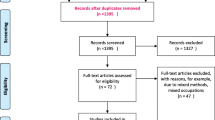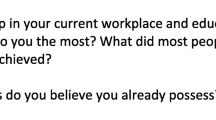Abstract
BACKGROUND
Although the benefits of mentoring in academic medical centers have been amply discussed, the major focus has been on conferring traditional academic skills (e.g., grantsmanship, publications, etc.). In contrast, little attention has been given to the career development of physician–leaders (e.g., communication, vision, teambuilding, etc.).
OBJECTIVES
To understand the role and functions of mentoring and role-modeling in developing physician–leaders as experienced by aspiring and established physician–leaders.
DESIGN
Qualitative design using a stratified purposeful sample and inductive analysis.
APPROACH
Semi-structured interviews.
RESULTS
Twenty-five Cleveland Clinic faculty participated (14 established physician–leaders, 11 aspiring leaders). Three themes emerged: 1. Role modeling was differentiated as a valued experience separate from mentoring, with respondents describing the significant influence of purely observational learning and “watching leaders-in-action”. 2. Many respondents favored a series of “strategic” interactions with various individuals about specific professional issues rather than traditional, longitudinal mentoring experiences. 3. Emotional and psychological support was considered the most valued type of interventional activity.
CONCLUSIONS
In our small sample both established and aspiring physician leaders believed that mentorship and role modeling played a significant role in their career development. Short, focused “strategic” mentoring relationships were favored by many over the classic longitudinal experience. Our participants valued role-modeling as an experience separate from mentoring and described the impact of learning from direct observation of skilled leaders. The educational implications of these findings are summarized.
Similar content being viewed by others
References
Lobas JG. Leadership in academic medicine: capabilities and conditions for organizational success. Am J Med. 2006;119:617–21.
Epstein AL. The state of physician leadership in medical groups: a study of leaders and leadership development among AMGA member organizations. Group Pract J. 2005;54:24–31.
McKenna MK, Gartland MP, Pugno PA. Development of physician leadership competencies: Perceptions of physician leaders, physician educators and medical students. J Health Admin Educ. 2004;21(3):343–54.
Taylor CA, Taylor JC, Stoller JK. Exploring leadership competencies in established and aspiring physician leaders: An interview-based study. J Gen Intern Med. 2008;23(6):748–54.
Stoller JK. Developing physician–leaders: Key Competencies and Available Programs. J Health Admin Edu 2009 (In press).
Morzinski JA, Diehr S, Bower DJ, Simpson DE. A descriptive, cross-sectional study of formal mentoring for faculty. Fam Med. 1996;28:434–8.
Williams RL, Zyzansky SJ, Flocke SA, Kelly RB, Acheson LS. Critical success factors for promotion and tenure in family medicine departments. Acad Med. 1998;73:333–5.
Ramanan RA, Phillips RS, Davis RB, Silen W, Reede JY. Mentoring in medicine. Am J Med. 2002;112:336–41.
Pololi L, Knight S. Mentoring faculty in academic medicine. J Gen Intern Med. 2005;20:866–70.
Sambunjak D, Straus SE, Marusic A. Mentoring in academic medicine. J Am Med Assoc. 2006;296(9):1103–15.
Jacobi M. Mentoring and undergraduate academic success: A literature review. Rev Educ Res. 1991;61:505–32.
Role model. 2008. In Merriam-Webster Online Dictionary. Accessed August, 2009 from http://www.merriam-webster.com/dictionary/rolemodel
Wright S, Wong A, Newill C. The impact of role models on medical students. J Gen Intern Med. 1997;1:53–6.
Linney BJ. Characteristics of good mentors. Physician Exec. 1999;25:70–2.
Inui TS, Frankel RM. Evaluating the quality of qualitative research. J Gen Intern Med. 1991;6:485–6.
Strauss A, Corbin J. Basics of Qualitative Research. Newbury Park, CA: Sage Publications; 1990.
Stoller JK, Berkowitz E, Bailin P. Physician management and leadership education at the Cleveland Clinic Foundation: Program impact and experience over 14 years. J Med Pract Manage. 2007;22:237–42.
Goleman D. What makes a leader? Harvard Bus Rev. 1998;76:93–102.
Mayer JD, Salovey P. What is emotional intelligence? In: Salovey P, Slouyter D, eds. Emotional Development and Emotional Intelligence: Educational Applications. New York: Basic Books; 1997:3–31.
Acknowledgment
We would like to acknowledge all of the Cleveland Clinic faculty who generously participated and provided thoughtful responses to our questions. In addition, we would like to thank Magda Muszka who transcribed all the wonderful ideas into text that we could analyze.
Conflict of Interest
None.
Author information
Authors and Affiliations
Corresponding author
Rights and permissions
About this article
Cite this article
Taylor, C.A., Taylor, J.C. & Stoller, J.K. The Influence of Mentorship and Role Modeling on Developing Physician–Leaders: Views of Aspiring and Established Physician–Leaders. J GEN INTERN MED 24, 1130–1134 (2009). https://doi.org/10.1007/s11606-009-1091-9
Received:
Revised:
Accepted:
Published:
Issue Date:
DOI: https://doi.org/10.1007/s11606-009-1091-9




